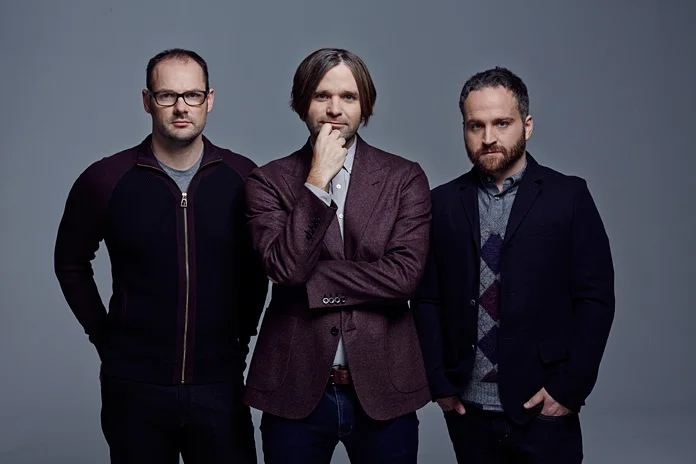Under the Radar, Issue 53
A few days before our interview, Ben Gibbard broke his right wrist. An avid long-distance runner for the past number of years, regularly clocking in 50 or more miles in a given week, the Death Cab for Cutie frontman was taking part in a 50K trail race on Washington's Orcas Island when he crossed a slick wooden bridge along the 20 mile mark. "Before I even knew it I was on the ground with my wrist really fucked up," says Gibbard in his Seattle apartment only a few hours before his scheduled surgery to repair the injury. "It's all going to be fine. Barring any kind of complications I've got plenty of time to heal. It's just a setback for a number of reasons."
Perhaps the most glaring reason Gibbard alludes to is the fact that his band of 18 years will soon be embarking on a number of Stateside and European tour dates behind their newest album Kintsugi. Recorded last year in Burbank, CA, at Eldorado Studios, the band's eighth studio album follows their 2011 album Codes and Keys, as well as Gibbard's 2012 solo debut Former Lives. Kintsugi is also the final record to feature founding band member and guitarist/producer Chris Walla, who, after the completion of the LP, left the group last September.
Though Walla's amicable exit was unexpected to fans, Gibbard says when Walla revealed his intention to leave during the making of the album, the moment was more of an understood inevitability for himself, as well as bassist Nick Harmer and drummer Jason McGerr. "I think we all knew at some time we would find ourselves at this impasse, due to a lot of factors," says Gibbard. "Mostly I think Chris all of a sudden found himself in a band because he had produced our [first] record." Noting that Walla's contributions and production work over the years were paramount to the group's success, Gibbard says, "Chris has always done his own thing. When [Nick, Jason, and I] would go to dinner, Chris would go off on a vision quest in whatever city we were in. Chris has always been that guy. He's always been the guy who was a part of the group but he was the kind of guy who needs his own space and does his own thing. We didn't expect him to socialize a lot when we were not on band time. Obviously [Chris wanting to leave] was a bittersweet pill to swallow. There were some moments you would kind of expect from the experience, but I also just think we were moving toward this."
By effectively clearing the air, Gibbard says the band allowed itself to "just get on with it" and enjoy the act of making a new record. With Walla stepping aside from production duties for the first time, the band recruited veteran Rich Costey to sit behind the console. Gibbard says Costey's presence wound up heavily influencing the group, pushing them to try things without any sense of pressure about how they might have been done in the past.
At the same time, Gibbard was confronting his own role as a songwriter. "For me every record that we make or that I make, it's a document of the period of time, and I think anybody with a computer knows that I went through a somewhat public divorce a handful of years ago," says Gibbard, referencing his marriage with actress/singer Zooey Deschanel. "And as I began writing songs for this record I talked to some friends candidly and kind of wondered how much of myself I wanted to put into the record because of some of the obvious things hanging around my life. Jenny Lewis said to me, 'No, fucking you just got to do it. You have to come correct. You have to go the whole way. Don't change who you are. Don't change who you are as a songwriter because you're trying to protect something or keep something veiled.' And she was right. This record is not a divorce record. It's certainly not that. I think this record touches on a lot of notes in my life for the past couple years. There are less songs on the record that are about [the divorce] than people think there are."
Between Gibbard's lyrical content and Walla's departure, choosing the term "Kintsugi" as the album's title helped everyone establish a feeling that things were moving forward. Introduced to the rest of the band by Harmer, the name refers to a Japanese method of repairing broken ceramics. Instead of making the shattered construction look exactly as it did before, gold is infused in the applied adhesive to give the pottery a completely new life. "We all really reacted to it because it's such a beautiful idea, highlighting the broken parts and making them beautiful," says Gibbard. "That certainly spoke to me as a songwriter who tends to write about the things I do. As a songwriter I strive to take all these ugly and broken parts of myself and try to make them elegant and in their own ways, beautiful."
Ultimately, Gibbard believes the experience of Kintsugi felt like a creative awakening for the band as a whole, and has little doubt that as a trio, they will continue to make records that people will enjoy. "The band will never be the same," says Gibbard. "To me that's exciting. It's exciting the band will never be the same."

